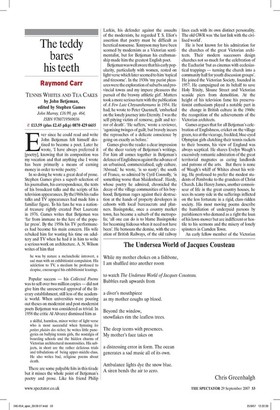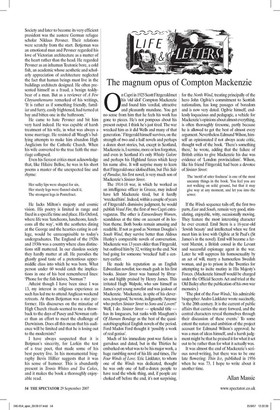The teddy bares his teeth
Raymond Carr TENNIS WHITES AND TEA CAKES by John Betjeman, edited by Stephen Games John Murray, £16.99, pp. 464, ISBN 9780719569036 £13.59 (plus £2.45 p&p) 0870 429 6655 Ever since he could read and write John Betjeman felt himself destined to become a poet. Later he wrote, 'I have always preferred it [poetry], knowing that its composition was my vocation and that anything else I wrote has been primarily a means of earning money in order to write poetry.'
In so doing he wrote a great deal of prose. Stephen Games gives a superb selection of his journalism, his correspondence, the texts of his broadcast talks and the scripts of his television appearances. By the1960s his radio talks and TV appearances had made him a familiar figure. To his fans he was a national treasure rightly created Poet Laureate in 1976. Games writes that Betjeman was 'far from immune to the lure of the popular press'. By the 1950s his TV performances had become his main concern. His wife rebuked him for wasting his time on adultery and TV when he had it in him to write a serious work on architecture. A. N. Wilson writes of him that he was by nature a melancholic introvert, a sad man with an exhibitionist compulsion. His addiction to TV, a medium he professed to despise, encouraged his exhibitionist leanings.
Popular success — his Collected Poems was to sell over two million copies — did not give him the unreserved approval of the literary establishment, still less of the academic world. When universities were pouring out theses on modernist and post-modernist poets Betjeman was considered as trivial. In 1958 the critic Al Alvarez dismissed him as a skilful, harmless, minor writer of light verse who is most successful when hymning les petites plaisirs des riches; he writes little panegyrics on bullying tennis girls, the nostalgia of boarding schools and the hidden charms of Victorian architectural monstrosities. His subjects, in short are the rather delicious trials and tribulations of being upper-middle-class. He also writes bad, religiose poems about death.
There are some palpable hits in this tirade but it misses the whole point of Betjeman's poetry and prose. Like his friend Philip Larkin, his defender against the assaults of the modernists, he regarded T. S. Eliot's assertion that poetry must be difficult as heretical nonsense. Tennyson may have been scorned by modernists as a Victorian sentimentalist, but for Betjeman his craftsmanship made him the greatest English poet.
Betjeman was well aware that his early popularity, particularly with women, rested on light verse which later seemed to him 'topical and tiresome'. In the 1930s 'my purist pleasures were the exploration of suburbs and provincial towns and my impure pleasures the pursuit of the brawny athletic girl'. Matters took a more serious turn with the publication of A Few Late Chrysanthemums in 1954. He had, he wrote to Peter Quennell, 'embarked on the lonely journey into Eternity. I was the self-pitying victim of remorse, guilt and terror of death'. 'He suffers,' wrote a reviewer, 'agonising twinges of guilt, but bravely incurs the reproaches of a delicate conscience by going on exactly as before.'
Games gives the reader a clear impression of the sheer variety of Betjeman's writings. For him all comes together in Betjeman's defence of Englishness against the advance of an urbanised, commercialised, ugly culture. 'Abroad,' he wrote, 'is so nasty'; the south of France, so admired by Cyril Connolly, 'is something worse than Maidenhead'. Hardy, whose poetry he admired, chronicled the decay of the village communities of his boyhood; Betjeman rages against their destruction at the hands of property developers in cahoots with local bureaucrats and planners. Basingstoke, once a country market town, has become a suburb of the metropolis; 'all one can do is to blame Basingstoke for becoming hideous when it need not have been'. He bemoans the demise, with the creation of British Railways, of the old railway lines each with its own distinct personality. The old GWR was `the last link with the civilised world'.
He is best known for his admiration for the churches of the great Victorian architects. Their modern successors design churches not so much for the celebration of the Eucharist 'but as cinemas with ecclesiastical trappings — turning the church into a community hall for youth discussion groups'. He joined the Victorian Society, founded in 1957. He campaigned on its behalf to save Holy Trinity, Sloane Street and Victorian seaside piers from demolition. At the height of his television fame his preservationist enthusiasm played a notable part in the change in British culture in the 1960s: the recognition of the achievements of the Victorian architects.
Games argues that for all Betjeman's celebration of Englishness, cricket on the village green, tea at the vicarage, freckled, blue-eyed Olympian girls clutching their tennis rackets to their bosoms, his view of England was always sceptical. He shares Evelyn Waugh's excessively romantic admiration of the great territorial magnates as caring landlords and patrons of the arts. But there is none of Waugh's whiff of Whites about his writing. He professed to prefer the modest students of Pembroke to the grandees of Christ Church. Like Henry James, another connoisseur of life in the great country houses, he sees its seamy side in the sufferings inflicted on the less fortunate in a rigid, class-ridden society. His most moving poems describe the humiliation of underpaid parsons by parishioners who demand as a right the loan of his lawn-mower but are indifferent or hostile to his sermons and the misery of lonely spinsters in Camden Town.
An early fellow member of the Victorian Society and later to become its very efficient president was the austere German refugee scholar Niklaus Pevsner. Their relations were scratchy from the start. Betjeman was an emotional man and Pevsner regarded his love of Victorian architecture as a matter of the heart rather than the head. He regarded Pevsner as an inhuman Teutonic bore, a cold fish, an academic whose aesthetic and scholarly appreciation of architecture neglected the fact that human beings must live in the buildings architects designed. He often presented himself as a fraud, a benign teddybear of a man. But as a reviewer of A Few Chrysanthemums remarked of his writings, 'It is rather as if something friendly, familiar and furry, easily frightened, had turned at bay and bitten one in the bathroom.'
He came to hate Pevsner and bit him very hard indeed. He was capable of harsh treatment of his wife, in what was always a tense marriage. He resisted all Waugh's bullying attempts to make him abandon High Anglicism for the Catholic Church. When his wife converted to the true faith the marriage collapsed.
Even his fiercest critics must acknowledge that, like Hilaire Belloc, he was in his short poems a master of the unexpected line and rhyme: Her sulky lips were shaped for sin, Her sturdy legs were flannel-slack'd, The strongest legs in Pontefract.
He lacks Milton's majesty and cosmic vision. His poetry is limited in range and fixed in a specific time and place. His Oxford, where life was 'luncheons, luncheons, luncheons all the way', with the aesthetes dining at the George and the hearties eating in college, would be unrecognisable to today's undergraduates. The England of the 1920s and 1930s was a country where class distinctions still mattered. In our classless society they hardly matter at all. He parodies the ghastly good taste of a pretentious uppermiddle class into which he was born. What person under 60 would catch the implications in one of his best remembered lines: 'Phone for the fish knives, Norman'?
Atheist though I have been since I was 13, my interest in religious experience as such has led me to attend Anglican weekend retreats. At them Betjeman was a star performer. His discourses on the minutiae of High Church rituals seemed to me a throwback to the days of Pusey and Newman rather than an effort to meet the challenge of Darwinism. Does all this mean that his audience will be limited and that he is losing out to the modernists?
I have always suspected that it is Betjman's sincerity, for Larkin the test of a true poet, that made some of his best poetry live. In his monumental biography Bevis Hillier suggests that it was his sense of humour. This is abundantly present in Tennis Whites and Tea Cakes, and it makes the book a thoroughly enjoyable read.
























































 Previous page
Previous page